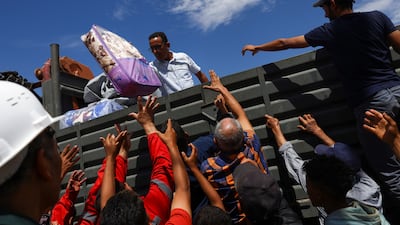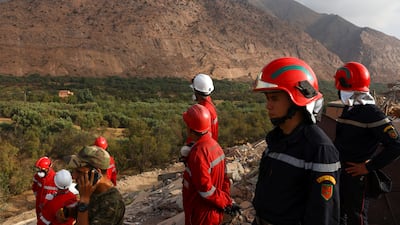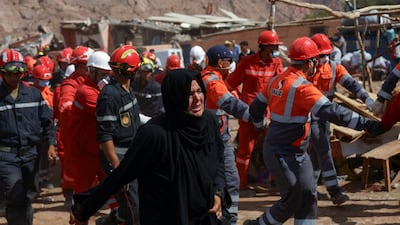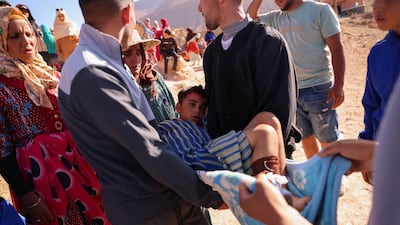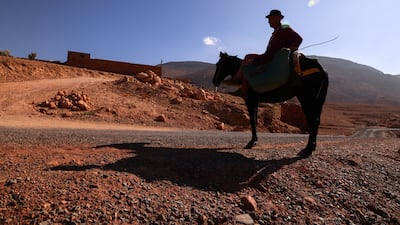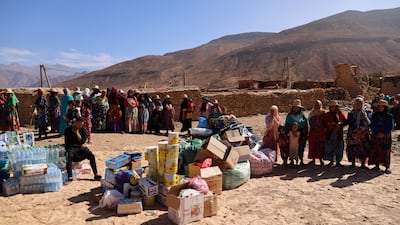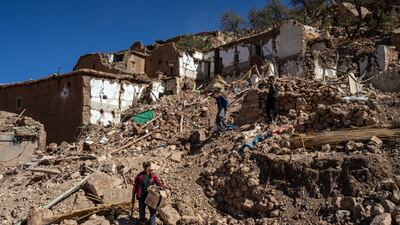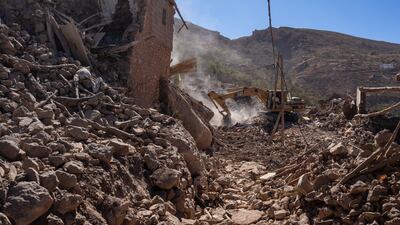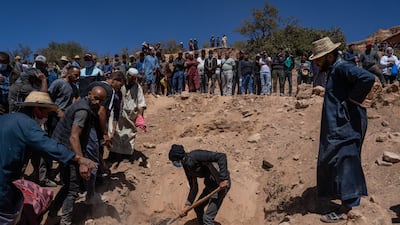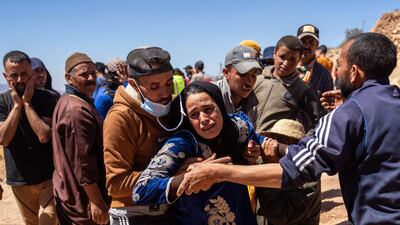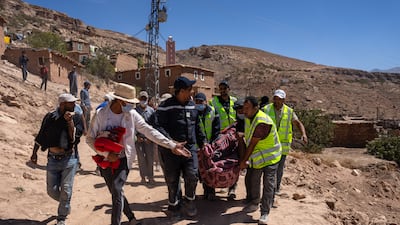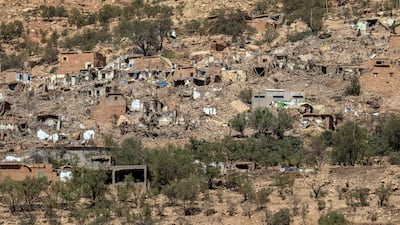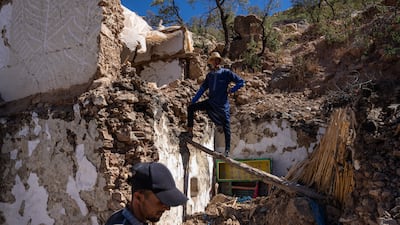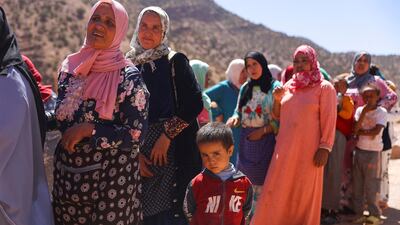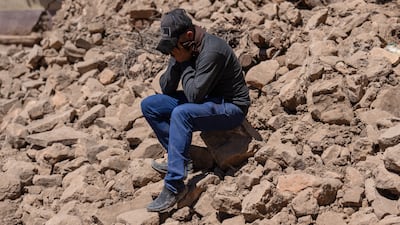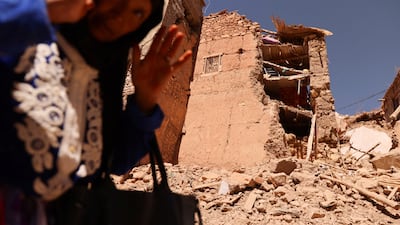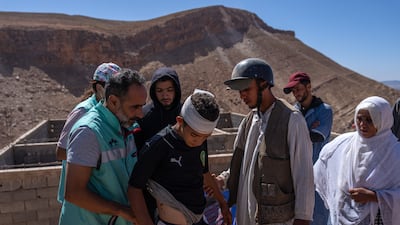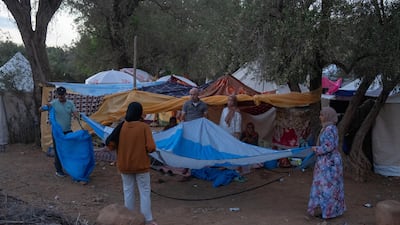Life is normal in the streets of Marrakesh, says Laila Lamb, despite the damage and debris after a 6.8-magnitude earthquake struck only 70 kilometres south-west of the city late on Friday.
Lamb is Moroccan, but grew up in New York City, and she owns a travel and events company that operates in her home country, where she now lives. She only narrowly missed the disaster, having left on a plane to Italy for an event on Friday evening. When she landed a few hours later, her phone pinged endlessly with messages from concerned friends and family.
When she realised what had happened, and understood the magnitude of the tragedy, she went into action. She’s spent the past three days on her phone, mobilising fellow tourism and hospitality business owners, and organising relief efforts.
“The city has superficial damages,” she tells The National over Zoom, speaking fast and frantically pacing around. “A lot of facades have been damaged and in the old city, because the construction is old, there was more destruction, but very low compared to other parts.”
The medina, a Unesco World Heritage Site, is the worst hit area of the city, with crumbling walls and damaged buildings that have been around since the 12th century.

The epicentre of the earthquake was up in the Atlas Mountains, an area that’s home to many isolated villages with no road access, which is where the most devastating damage has taken place. “People are burying the dead and waiting for help,” says Lamb, who knows those who have lost family members and had their entire village wiped out.
As of Tuesday, the death toll is creeping closer to 3,000 and Unicef has said at least 100,000 children have been affected. While the country experiences frequent earthquakes, the last major tremor, in 2004, killed 628 people.
The Atlas Mountains are also a very popular tourist destination. Charlie Shepherd, the British owner of Epic Travel, which designs custom trips for travellers in Morocco and Portugal, had a group staying in a hotel in the mountains when the earthquake hit, he tells The National. As the property crumbled, Shepherd’s team spent the night getting people out and to safety in Marrakesh, which “was essentially in pretty good nick,” he says. “Particularly in the new part of the city, which was a bit of a safe haven.”
He has since driven around the mountains to get an idea of the damage, assessing whether his clients should still come. “From what I see is absolutely, yes,” says Shepherd. So far, Epic Travel has only received one cancellation. “But we’re a fairly niche company, we don’t have huge volume and we also have close communications with our direct clients... There’s a tendency for people to go along with us as we’re on the ground," he says.
“There are definitely cancellations coming in elsewhere, which is to be expected as that does tend to happen and it’s a knee-jerk reaction,” he adds. “I think hotels will get hit quite badly by that. They don’t have the chance to speak to people and that’s key.”
After taking a couple of days to do due diligence, Shepherd is telling his clients it's safe to come. Some operators on the ground, however, have postponed tours and are offering refunds, and, naturally, any tours to certain areas of the Atlas Mountains are on hold indefinitely.

Philomena Schurer Merckoll, a hotelier with Riad Mena, emphasises how reliant Marrakesh is on tourism for its economy. Figures show that pre-pandemic, in 2019, the industry contributed up to 12 per cent of the country's GDP, with a total value of about 140.4 billion Moroccan dirhams ($15.6 million), according to data from the World Travel and Tourism Council. The country had projected a return to pre-pandemic levels this year.
"Obviously the worry is that people will cancel their trips to Marrakesh," says Merckoll. "Things will be back to normal quite quickly in the city and the best way to support the people is to keep your trips as planned and support local businesses from hotels to the artisans in the souqs."
But Lamb says she has found people around the world seem to think Marrakesh has been destroyed. "What I really want people to know is that it is safe to visit Morocco. More than ever we really need people to come and support us now.”
Moroccans want the world to know their country is open, Shepherd adds. "They need help and support through what tourism can bring.
“The solidarity of everybody here is just unbelievable. It would take a lot more than an earthquake to crush the spirit of Moroccans.”
'Be assured that the recovery in Marrakesh will be quick'
The airport, located in the west of the city, is operating as normal, although some flights have been cancelled or delayed over the past few days. The US Embassy in Morocco recommends contacting airlines directly about potential changes to any trips.

The UK foreign office confirms flights to and from the UK are operating normally, with some airlines, including British Airways, laying on additional seats for travellers wanting to go home earlier than planned. “If you are planning to travel to Morocco imminently, we advise you check with your accommodation provider / tour operator to confirm arrangements before departure in case of disruption or damage resulting from the earthquake,” a statement reads on its website.
Meanwhile, the UAE operates no direct flights to Marrakesh Menara Airport, as Emirates serves Casablanca, while Etihad Airways offers a code share with Royal Air Maroc, with flights going through European cities including Istanbul and Barcelona. The local Moroccan airline is offering free date changes to customers who are travelling up until September 23. British Airways Holidays is doing the same for anyone travelling to or from Marrakesh in the next two weeks.
Hotels in the city are also open for business, although some, including Fairmont Royal Palm Marrakesh and Nobu Hotel Marrakech, which only opened in January, sustained minor damage, The National confirmed. El Fenn Hotel, a luxury property in the medina, also reported cosmetic damage and has closed its rooftop and boutique until Wednesday afternoon.
“Be assured that the recovery in Marrakesh will be quick, but it will be a far longer process for many rural communities,” the hotel shared in a post on social media. “We hope many of you will participate in the process by donating, travelling and supporting this beautiful land we’re proud to call home.”
It's properties in the mountains that have sustained the most damage, says Shepherd, making it difficult for tourists to visit those areas for now.
Souvenir shops and other stalls in the old town have also experienced destruction, particularly broken stock, says Lamb, and all of the events she’s heard of within the next month or so in the city have been postponed or called off.
Travellers must also be wary that hospitals in the area have limited capacity as they treat survivors.
But the government is reacting "extremely well", says Lamb, particularly with cleaning up the streets and removing debris. "There’s such an incredible effort to have everything rebuilt. The Moroccan people are incredible. I can’t believe what I’ve seen in the past 48 hours. People mobilising together, it's been the most heartwarming community effort."
Will there be any lasting impact on travel and tourism?
“I think for the next few months there will definitely be an impact [on tourism], but I personally think after December things will bounce back,” says Lamb.
Shepherd is also optimistic there won’t be any lasting impact on the local tourism industry, although in the short term he says it’s a “complex picture”.
For now, everyone in the city is focused on rebuilding. Both Shepherd and Lamb are involved in separate donation campaigns. Lamb flew back on Tuesday to join the 20 or so other entrepreneurs who are part of her relief efforts as they continue to collect money, food, water, beds, tents and trucks. Together they have raised more than $20,000 so far.
Shepherd’s company, meanwhile, has set up a funding page for Afoulki, a local NGO that helps women and families and is now working to relieve affected areas. Through that, they’ve raised more than €20,000. “We’re also using some of our cars to ferry supplies up to the mountains. We’re just doing what we can, really.”
In the UAE, tour operator Forever Tourism, which offers trips between Dubai and Morocco, is already planning promotional packages for its clients to "help attract visitors back to the region and provide an economic boost to local businesses", owner Kapil Sahansi confirmed to The National.
“I really encourage people to come,” says Shepherd. “Moroccans are such hospitable people in their nature. Hospitality has risen up from the Sahara, it’s something everyone has here and they’re delighted to see people from abroad and never more so than now.
“It’s really an act of support to come out to Morocco.”
Lamb agrees. “Our culture is very special and people, when they come here, always talk about how hospitable and kind Moroccans are. It really shines in times like this," she says.
“The uniqueness and how kind and giving and open-hearted our culture is – I think it’s because of that, that we will be able to bounce back quickly.”

